Woman Refuses To Lock Her Dog In Bedroom While Her Niece Is Visiting Because She Doesn’t Believe Her Parents Are Addressing Her Pet Phobia Properly
Dog ownership brings a lot of responsibilities. One of the biggest problems is taking care of your dog when you have a house full of guests.
Especially if some of them are afraid of dogs. Dogs are social animals.
That’s the reason we love them so much. But even social animals can get overwhelmed by too many people and can act unpredictably.
Hosting a Christmas family gathering with around 30 people in your home sounds exhausting. And it is, both for the people and pets in that home.
One Redditor posted a question: “WIBTA for not locking my dog in a room Christmas Day since my niece doesn’t like dogs?” She has a niece who is afraid of dogs and cats.
Her parents don't really do anything about it; they even encourage it.
“My niece is 9 and has always been terrified of dogs (and cats) - no, she has never been bitten or attacked. Her parents have never tried to help or work out where this started; in fact, her mother plays into it - i.e.,
‘Come here, DD, the big dog is locked away and can’t hurt you.’ They never try to explain that the dog won’t hurt her - just that it can’t.”
Going to therapy was mentioned, but only that. OP has a small indoor dog that's great with kids.
OP was told she would be having all of her family at her house for Christmas. She doesn't want to lock her dog because she doesn't think it will cause any problems.
She doesn't have a good relationship with her brother and doesn't want to make it any worse.
OP asks:

She has a niece who's afraid of dogs and cats. Her parents don't really do anything about it - they even encourage it

Going to therapy was mentioned, but only that

Understanding Phobias and Family Dynamics
Dr. Susan Mineka’s research on specific phobias emphasizes the role of family dynamics in developing and managing fears. The Redditor’s niece's pet phobia may indicate underlying issues that require careful handling. Mineka's studies suggest that families play a crucial role in either reinforcing or alleviating phobic responses.
In this case, the Redditor's refusal to lock her dog away could reflect a desire to challenge the niece's fear while also asserting her own boundaries.
The Role of Phobias in Family Dynamics
Dr. Jessica Tran, a clinical psychologist at Duke University, discusses how phobias can impact family relationships and dynamics.
The niece’s fear of dogs might stem from past experiences, and failing to address this phobia adequately can lead to increased tension within the family.
Research indicates that phobias often require a compassionate approach for effective management, particularly in family settings.
OP has a small indoor dog that's great with kids

OP was told she would be having all of her family at her house for Christmas. She doesn't want to lock her dog

She doesn't think the dog will cause any problems

Moreover, research indicates that parents often unknowingly reinforce children's phobias by avoiding triggers, which can hinder the development of coping mechanisms. This situation suggests the need for a balanced approach in addressing the niece's fear, one that includes gradual exposure and supportive family engagement.
Moreover, this situation illustrates the importance of understanding and supporting loved ones who experience phobias.
Studies show that families who actively engage in discussions about fears and anxieties can foster a supportive environment that encourages healing and understanding.
Creating a safe space for open dialogue can help alleviate some of the distress associated with phobias.
She doesn't have a good relationship with her brother and doesn't want to make it any worse

She posted an edit:

OP has offered the following explanation for why they think they might be the asshole:

Addressing Phobias with Empathy
To effectively address the niece's phobia, experts recommend employing gradual exposure techniques. This approach involves slowly introducing the feared object—in this case, the dog—in a controlled manner while providing reassurance. Research shows that gradual exposure can significantly reduce anxiety associated with phobias, fostering resilience over time.
Additionally, creating a supportive environment where the niece feels safe expressing her fears can enhance the effectiveness of this method.
Addressing Phobias with Compassion
Addressing phobias requires a nuanced understanding of the individual’s experiences and feelings.
Dr. Aaron Beck’s cognitive therapy techniques emphasize the importance of gradual exposure and cognitive restructuring in overcoming fears.
Engaging in these practices can help the niece develop coping strategies and reduce her anxiety around dogs.
OP didn't ask to be the one in charge of the holiday
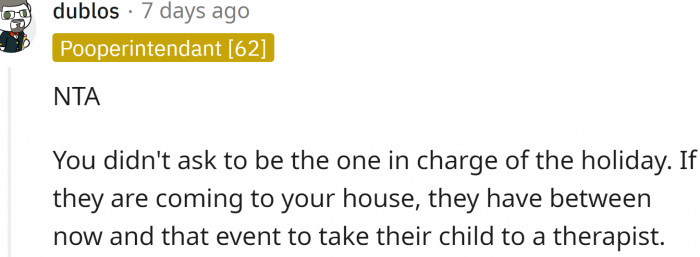
Would there be a potential that someone could mistakenly let your dog out?

This is true:

Involving mental health professionals may also provide valuable support for the niece's phobia. Therapeutic interventions, such as Cognitive Behavioral Therapy, can equip her with coping strategies and techniques to manage her fear. Studies indicate that early intervention can lead to improved outcomes in managing phobias and fostering emotional well-being.
To support the niece effectively, family members should consider seeking professional guidance to understand her phobia better.
Experts recommend involving a therapist who specializes in anxiety disorders, as targeted interventions can lead to successful outcomes.
This approach can help the family navigate the complexities of the niece’s phobia while fostering a supportive environment.
OP says:

They added:

"Give them the choice to not come OR to work with their child in advance on her phobia."
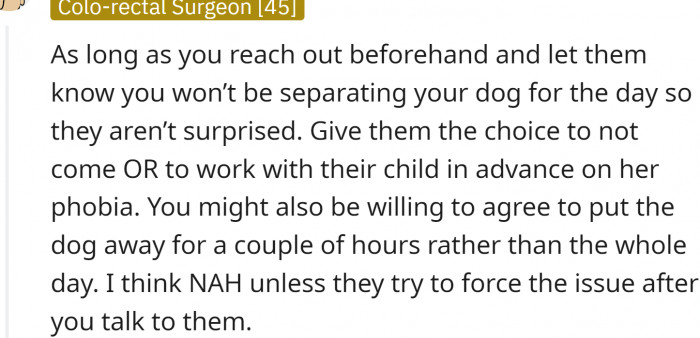
The Importance of Family Support in Overcoming Fears
Family support is crucial in managing phobias and fears, as it can significantly influence the healing process.
Research indicates that individuals with strong family support systems tend to have better outcomes in managing their anxieties.
By offering understanding and patience, families can help their loved ones face their fears more effectively.
One Redditor shared:
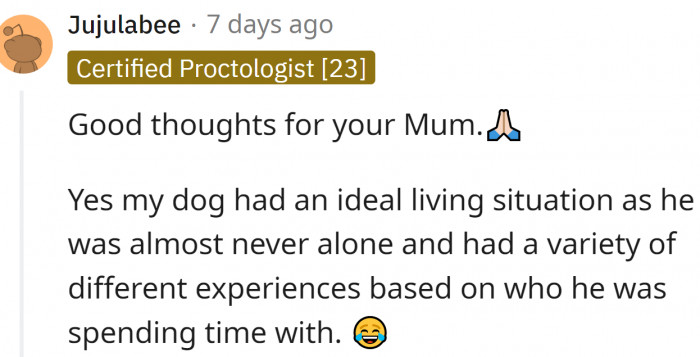
Actually living with a dog sometimes can help with phobias
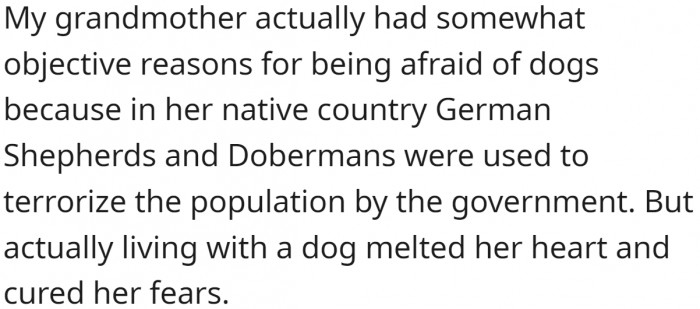
"You make the rules in your house"
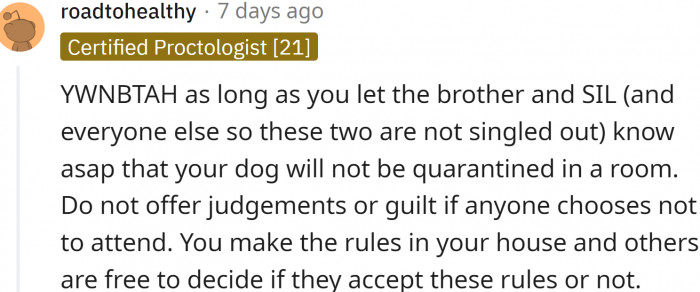
Ultimately, addressing phobias requires a collaborative effort from the entire family.
By fostering an environment of empathy and support, family members can help each other navigate the challenges posed by fears and phobias.
This collective approach can promote healing and strengthen family bonds.
Host by demand

30 people in the house will be very stressful for the dog

Some people don't expect others to cater to their phobias
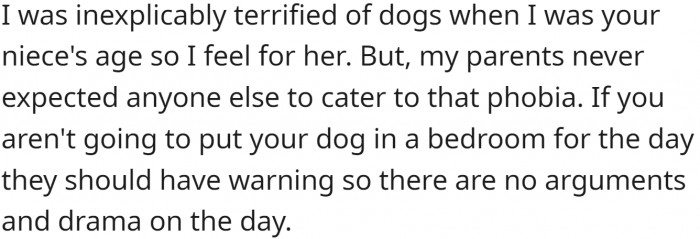
OP posted another edit:

Well, this is one interesting family story. We can only say—family stories are always interesting, always full of drama.
Especially when extended families are concerned. OP didn't ask to be the one in charge of the holiday, but she has to deal with it. We hope everything turns out okay.
Psychological Analysis
This situation underscores the complexities of managing phobias within family dynamics, highlighting the need for empathy and understanding.
Addressing these fears collaboratively can help create a supportive environment conducive to healing.
Analysis generated by AI
Analysis & Alternative Approaches
In conclusion, understanding phobias and their impact on family dynamics is essential for effective management.
According to Dr. Susan David, an emotional agility expert, "Family support is crucial in addressing fears; it allows individuals to feel safe and understood." Additionally, Dr. Tal Ben-Shahar, a happiness researcher, emphasizes that "Therapeutic interventions can significantly improve the well-being of those struggling with anxieties, fostering healthier family relationships."
Analysis & Alternative Approaches
In conclusion, understanding and addressing phobias requires a compassionate approach that considers family dynamics. Clinical psychologists emphasize the importance of balanced exposure and support in overcoming fears. Dr. Susan David, an emotional agility expert, states, "Emotional agility is about being flexible with your thoughts and feelings, so you can respond effectively to life's challenges" on her website susandavid.com. Involving professionals can significantly enhance the management of phobias and emotional challenges, as noted by Dr. Amy Cuddy, a social psychologist, who emphasizes that "the way we present ourselves can change how we feel and how we are perceived by others" on her site amycuddy.com.



